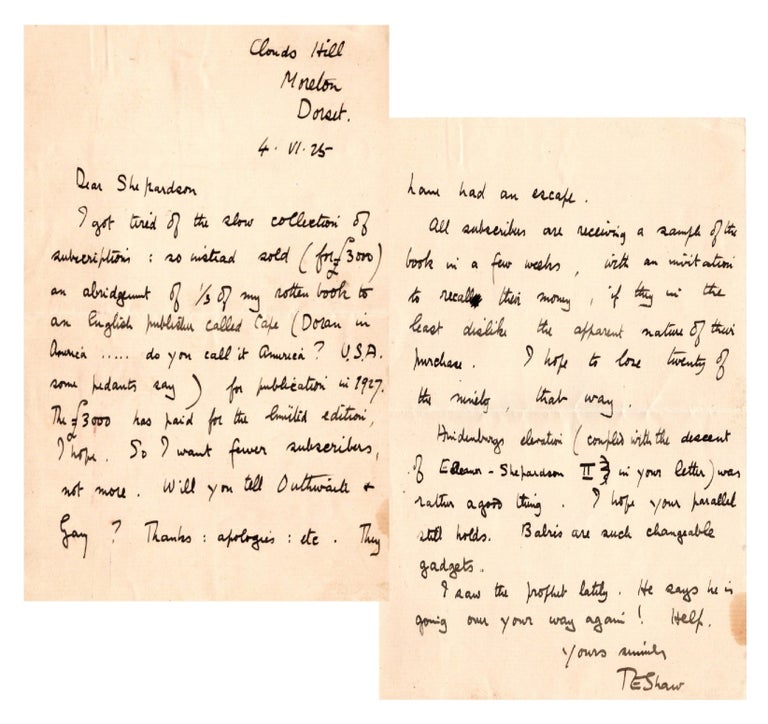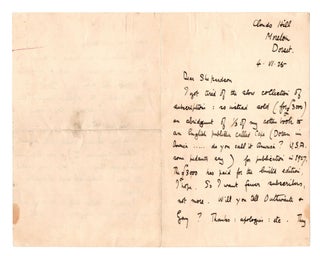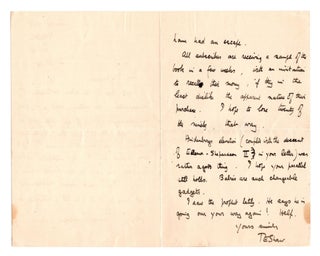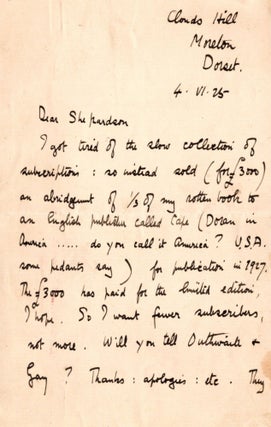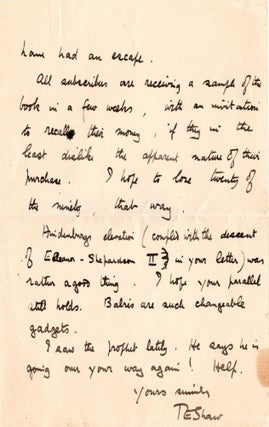"...my rotten book" - A 4 June 1925 autograph letter signed from T. E. Lawrence "of Arabia" to American executive, editor, author, and international figure Whitney Hart Shepardson encapsulating Lawrence's compellingly conflicted feelings regarding forthcoming publication of both the Subscriber's Edition of Seven Pillars of Wisdom and the abridged version of the work, Revolt in the Desert
Clouds Hill, Moreton, Dorset: 1925. Letter. This 4 June 1925 autograph letter signed from T. E. Lawrence “of Arabia” to American Whitney Hart Shepardson with compelling content related to Seven Pillars of Wisdom, which had not yet seen conventional publication in any form. The letter includes a strikingly denigrating reference to Lawrence’s magnum opus, for which he was in the midst of preparing the famous “Subscriber’s Edition”, as well as discussion of the financial pressures which had driven him to consent to broader publication of an abridged version for the general public.
When Lawrence wrote to Shepardson, publication of his Subscriber’s Edition of Seven Pillars was still half a year away. Lawrence had just come to agreement with the publisher two and half months before to publish an abridged version of Seven Pillars, which would be titled Revolt in the Desert, which he had not yet begun to prepare, and which would not be published for another 21 months.
The letter is written from Lawrence’s cottage at “Clouds Hill | Moreton | Dorset” is dated “4.VI.25” on a single sheet of 8.75 x 7 inch (22.2 x 17.8 cm) laid paper stationery watermarked “ORIGINAL BLACKFRIARS MILL". The sheet is folded vertically to form four panels, the letter inked on the first and third of these. Following the salutation “Dear Shepardson”, the letter reads “I got tired of the slow collection of subscriptions: so instead sold (for £3000) an abridgement of 1/3 of my rotten book to an English publisher called Cape (Doran in America….. do you call it America? U.S.A. some pedants say) for publication in 1927. The £3000 has paid for the limited edition, I hope. So I want fewer subscribers, not more… All subscribers are receiving a sample of the book in a few weeks, with an invitation to recall their money, if they in the least dislike the apparent nature of their purchase. I hope to lose twenty of ninety that way…” Additional content in the letter refers to notional would-be subscribers Lawrence is turning down, Paul von Hindenburg’s election as president of Germany’s Weimar Republic, and Shepardson’s family. The valediction “Yours sincerely” is followed by Lawrence’s signature as “T E Shaw”.
Condition of the letter is very good overall, complete, the ink clear and unfaded. The letter shows modest overall soiling and staining and a horizontal fold, presumably for original mailing. The letter is protected within a clear, removable mylar sleeve and housed in a rigid crimson cloth folder.
T. E. Lawrence's (1888-1935) remarkable odyssey as instigator, organizer, hero, and tragic figure of the Arab revolt against the Ottoman Empire during the First World War transformed him from an eccentric junior intelligence officer into "Lawrence of Arabia." He spent the rest of his famously short life struggling to variously reconcile, reject, share, and repress this indelible experience. The spectacle of this tortured conflict is clearly on display in this letter about his “rotten book” which he is contorting himself to both publish and suppress simultaneously.
Lawrence expresses weariness with the “slow collection of subscriptions” even as he asserts that he wants “fewer subscribers, not more.” Having made a £3000 Faustian bargain to allow publication of an abridged version just to finance the longer Subscriber’s edition, Lawrence nonetheless cannot bring himself embrace the object for which he is sacrificing. He asks Shepardson to dissuade and “make apologies” to prospective subscribers. Lawrence even expresses hope that the imminent circulation of a Prospectus for the work will cause him “to lose twenty of the ninety” subscribers he already has. To these he will issue “an invitation to recall their money”. It is mad, blatantly contradictory, and perfectly encapsulates Lawrence’s perpetually unsettled, kaleidoscope feelings about Seven Pillars of Wisdom. As if to underscore his private war with his own publicity and persona, the letter is signed “T E Shaw” – the name under which he enlisted in the Royal Air Force and which he used until his death.
The history of the publication of Seven Pillars of Wisdom and its many versions - including Revolt in the Desert - is almost as complicated and tortured as the author himself. After years, multiple drafts, and brutal rounds of editing and reduction, in 1926, the Subscriber’s Edition referenced in this letter was produced by Lawrence - but fewer than 200 copies were made, each lavishly and uniquely bound. As intimated in this letter, the process indeed cost Lawrence far more than he made and drove Lawrence to finally consent to publication of an abridgement of Seven Pillars of Wisdom.
In the end, Lawrence clearly both rushed and resented the financial necessity of the abridgement, which he did not complete until late March of 1926. Taking a set of proofs of the Subscriber’s Edition, Lawrence swiftly marked out whole chapters and large portions of others. “Chapters 1-7 were dropped completely, and of 652 pages 211 were omitted entirely… Once his debt had been cleared, he ordered that no more copies were to be printed.” (O’Brien, pp.77-78) Revolt in the Desert was the only version of his work published for the general public during Lawrence’s lifetime.
The recipient of this letter, Whitney Hart Shepardson (1890-1966) was, like Lawrence, an accomplished intellectual who did not confine himself to intellectual pursuits. A Rhodes Scholar, Shepardson attended Balliol where he was the first American to win the Gladstone Memorial Prize for the best thesis in history. Shepardson may have met Lawrence at the 1919 Paris Peace Conference, where he was an aide to presidential advisor Edward M. House and served as secretary to the commission drafting the League of Nations Covenant. In the early 1920s Shepardson helped found the Council on Foreign Relations and in the 1930s became the principal editor of the Council’s annual review of world events. When Lawrence wrote him this letter, Shepardson was serving as Director of the Rockefeller General Education Board. During the Second World War, Shepardson headed the Secret Intelligence unit of the Office of Strategic Services (forerunner to the CIA) and, in the 1950s, served as president of the Free Europe Committee, operator of Radio Free Europe. Item #007310
Price: $9,500.00

